Contents
Each farmer or summer resident treats the choice of a variety of vegetable crops with great responsibility. The potato is no exception. To get a decent harvest at the scheduled time, you should seriously study the characteristics and benefits of the desired variety. German breeders offer a new variety of Granada potatoes, bred in 2015.
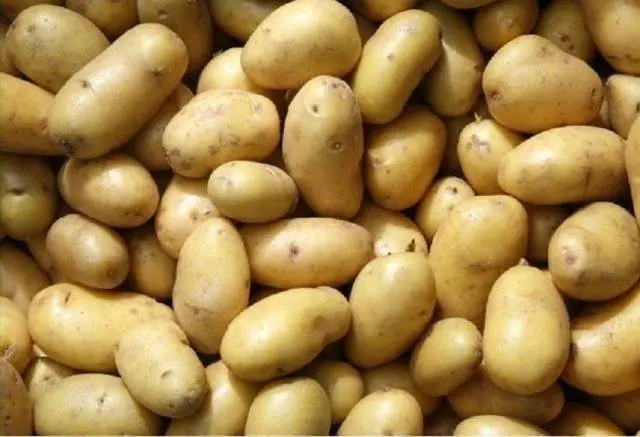
Literally in one season, Granada won the hearts of many potato lovers. To appreciate the variety, you will have to get acquainted with its advantages and features. For what qualities gardeners prefer the new product? How to determine the required variety?
Variety of potato varieties
It is the opportunity to choose that makes this culture very popular. To begin with, you should know that potatoes are divided according to yield and ripening time:
- Early varieties. The difference of this group from other species is the rapid growth and short growing season. Planting of these varieties of potatoes begins in early spring. Already in early April, the first tubers fall into the ground, and after 65 (on average) days, the crop is ready for harvest. In the vacant garden space, you can plant another crop that will have time to give a new crop before the fall. The disadvantage of early potatoes is the inability to store. It will not lie for a long time and will quickly become lethargic – it loses moisture.
- Medium-Early Varieties. They are considered more unpretentious, capable of storage. The tubers of such potatoes must be prepared for planting (sprouting). The harvest is obtained a little later than the early varieties – after 80 days.
- Medium-ripening varieties. Most often, the choice of gardeners falls on these types of potatoes. Harvest is ready for harvest in 90-100 days. This period usually falls on August. They are considered less whimsical, with good taste.
- Mid-late and late varieties. The most suitable varieties for long-term storage, which provide delicious vegetables during the winter. The tubers do not need to be germinated, the varieties are more resistant to diseases and adverse conditions. Harvest ripens in 110-120 days.
Mid-early and mid-late are classified as intermediate varieties of potatoes. The high content of starch, vitamins and protein makes potatoes indispensable in nutrition. If a variety is needed for winter consumption, then among the qualities that tubers possess should be:
- good keeping quality;
- a long period of rest;
- resistance to storage diseases.
Such a variety that fully meets all the requirements is quite problematic to find. But still, breeders are trying to develop potato brands that best meet the needs of vegetable growers. Among such reliable varieties, Granada potatoes should be noted.
Description and features
If you start the description of the Granada variety from the appearance, then you will need to note the attractiveness of the tubers.
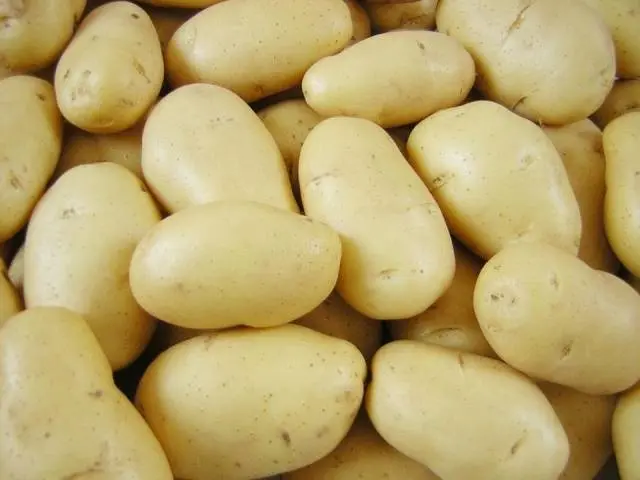
They differ in medium size and beautiful oval-oblong shape. The weight of each Granada potato ranges from 100 g, so all tubers look very neat due to almost the same size. The eyes are harmoniously located over the entire surface of the skin, without disturbing the attractiveness of the tubers. This gives the Granada potato a high-quality presentation. Therefore, the variety enjoys the attention of not only summer residents, but also farmers who grow potatoes for sale. Skin and flesh color is light yellow. In case of damage and after heat treatment, the tubers of the Granada variety do not change their color and do not darken. This is another significant plus for buyers.
The taste qualities of the Granada variety are very high. The skin is thin, smooth, but strong. The pulp is tender and pleasant in taste. Potato “Granada” is used to prepare culinary delicacies and is recommended for dietary intake. In terms of its nutritional composition, it is distinguished by a high content of starch (over 17%), which makes the tubers palatable.
The Granada variety, whose yield characteristic is very high, is in deserved demand. After all, up to 15 potatoes are harvested from one mature bush. This species belongs to the medium-late, so the crop is harvested 110 days after planting. The yield of potatoes “Granada” is more than 6,5 kg per 1 square. m of land area, which makes it possible to grow only this variety, without duplicating others.
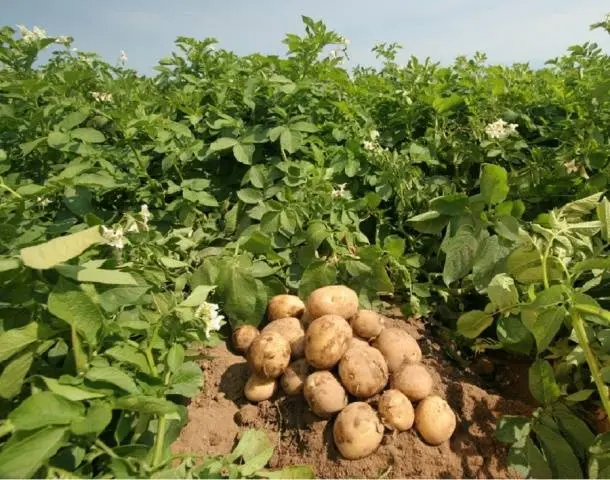
Keeping quality or storage capacity is always considered an important quality for potatoes. No appearance will save the crop if the tubers rot or dry out in winter. Variety “Granada” justifies all the expectations of vegetable growers. Keeping record – 97%. Waste of material after winter storage is on average 3%. Breeders took into account all the requests of potato growers when breeding the Granada variety.
The bush of the plant is classified as an intermediate type, the height of one is in the medium range. The ground mass is quite low, but some plants can grow to medium size. The leaf mass is light green, small.
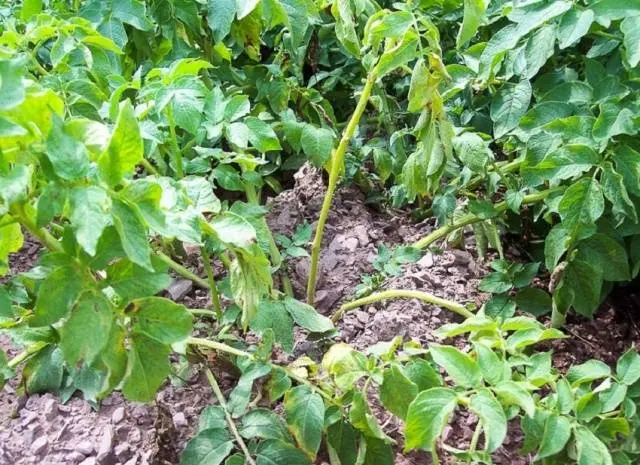
Another important quality that the Granada variety possesses is drought resistance. In addition, this potato grows well in any soil. If all these advantages have attracted your attention, then you should take a closer look at the agricultural technology of growing wonderful potatoes.
Responsible moment – getting ready for landing
Experienced potato growers start preparing for planting in the fall. As soon as the crop is harvested and sorted, it is necessary to proceed with the selection of seed material. For planting, it is necessary to choose large healthy tubers of the Granada variety that can produce good sprouts. Many gardeners believe that small potatoes should be taken for planting, but this can lead to a significant decrease in yield and loss of valuable qualities of the variety. For the Granada potato variety, the selection of large, good tubers from full-fledged bushes for the new planting year remains an important requirement. In the spring, according to the recommendations of experts, you can do two things:
- plant seed immediately in open ground;
- grow seedlings, which gives a yield increase of 40%.
In the first option, the Granada tubers are planted, focusing on the recommendations of the lunar sowing calendar. But, many gardeners simply stick to the usual dates, and start planting Granada potatoes at the end of April. If the soil is not warm enough, then planting is postponed for a week or more. It depends on the climate of the region and soil temperature. It must be at least +8°C.
For the second option, the tubers are first placed for germination in a mixture of peat and earth, covered. When sprouts appear, they are broken off and placed in boxes with prepared soil. It should include garden soil, peat and sand. Peat is taken 4 times more than land. The amount of sand depends on the composition of the garden soil. Sprouts must be deepened by 2/3 and watered as the soil dries. The box is placed so that the illumination is very good, covered with a film. The first shoots usually appear after 18 days. After another 14 days, they are ready to land on a permanent place of residence.
The method of planting Granada seed potatoes depends on the type of soil and weather conditions in the growing region. The dry, hot climate and light soil allow tubers to be planted in holes or furrows. With more damp and dense soil, ridges are made to raise the bushes above the ground. Clay soil requires a planting depth of no more than 5 cm, but with loose and fertile soil, the depth reaches 12 cm.
The optimal row spacing is 65-70 cm. This arrangement of rows will allow Granada potato bushes to have good lighting and air access. A distance of at least 30 cm is maintained between plants. When planting, the soil is fertilized with ash. Half a glass of ash is added to each well, be sure to moisten the soil. Then put a potato and sprinkle with soil. If there is not enough ash or not at all, then you can feed it with mineral complex fertilizers according to the instructions.
Basic care requirements
The main stages of agricultural technology remain the same as for other varieties. Potato “Granada” refers to unpretentious varieties with a high degree of drought resistance and adaptability to growing conditions. The main stages of quality care for the variety “Granada”:
- Hilling. Until the Granada potato reaches its ripeness, it is necessary to carry out this procedure at least twice. The first at a bush height of 15-16 cm, the second – before flowering. To do this, use the earth in the aisles, raking it to the base of the bushes. Skipping this step is not recommended for several reasons. Firstly, hilling will allow you to form a neat bush and prevent it from falling apart. Secondly, it will improve the yield of Granada potatoes due to the formation of additional underground stems. Thirdly, it will protect seedlings from possible frosts.
- Food. The first time to feed potatoes should be after planting, a month later. A mixture of mineral fertilizers is used: urea, potassium sulfate and superphosphate in a ratio of 1:1:2. Where 1 is 10 g, respectively, 2 is 20 g. This amount should be taken per 10 liters of water. If you need more, then increase the amount of minerals. The mixture is diluted and watered potatoes. Organic is a great option. Granada potatoes respond very well to bird droppings. The main thing is to use it correctly so as not to burn the plants. The litter is insisted for at least a week, diluted with 0,5 liters in a bucket of water and watered potatoes. The second time the plants are fed when the buds appear, the third – after flowering.
- Watering.
 For the variety “Granada” you need to withstand moderate watering. Under normal climatic conditions, watering should be carried out no more than three times per season – after germination, after budding, after flowering. In rainy weather, you can not water at all until flowering. Watering is considered high-quality if the soil is wetted by 50 cm.
For the variety “Granada” you need to withstand moderate watering. Under normal climatic conditions, watering should be carried out no more than three times per season – after germination, after budding, after flowering. In rainy weather, you can not water at all until flowering. Watering is considered high-quality if the soil is wetted by 50 cm. - Prevention, control of diseases and pests. For the variety “Granada” there is a danger of alternariosis, in which all structures of the plant are affected.
 To prevent such a disaster, tubers are sprayed before planting. Biological preparations “Baktofit”, “Integral”, “Planriz” are suitable for prevention. The vegetative period requires treatment with a 0,2% solution of other drugs – Profit, Kuproksat, Thanos. To prevent Fusarium wilt of Granada potatoes, it is best to use Baktofit or Fitosporin.
To prevent such a disaster, tubers are sprayed before planting. Biological preparations “Baktofit”, “Integral”, “Planriz” are suitable for prevention. The vegetative period requires treatment with a 0,2% solution of other drugs – Profit, Kuproksat, Thanos. To prevent Fusarium wilt of Granada potatoes, it is best to use Baktofit or Fitosporin.
These drugs must also be used during pre-sowing treatment. If this is not done, then the entire crop will be in jeopardy. This infection is very dangerous for Granada potatoes due to its rapid spread. During the period of the disease, it is very difficult to save plants. Preventive treatments should also be done against different types of potato rot.
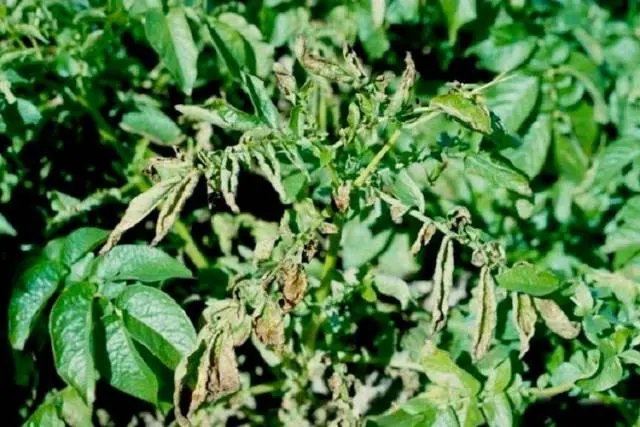
Among the pests, the Colorado potato beetle is considered the most dangerous. The damage that this pest does is the most tangible. Also, the larvae of the click beetle are dangerous. They are called wireworms. Control measures for these pests are similar for all crops that are affected by them.
With due attention to the variety, “Granada” will thank with an unprecedented harvest.
We receive well-deserved rewards
Harvesting is always a special time for farmers. This is the time to get results.
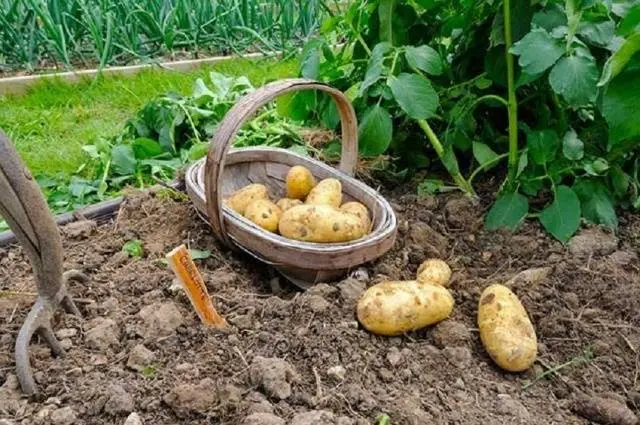
Granada potatoes are ready for harvest 3,5-4 months after planting. During manual assembly, the bush is dug up with a shovel and the tubers are collected. The process of sorting potatoes should not be neglected. You can immediately select the best seed material for the next year and choose potatoes for winter storage. To better preserve the potatoes, they are sprayed. A solution of copper sulfate is prepared (2 g per 10 l) and all tubers are processed. For storage, seed potatoes “Granada” and food are placed separately. It is necessary to provide a dry, cool and dark room. The optimum temperature is from +2 to +4°C. Tubers are periodically inspected to remove spoiled ones so that the rest of the crop is not affected.










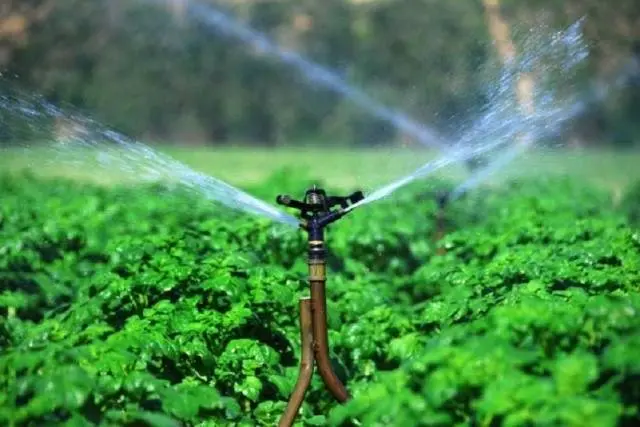 For the variety “Granada” you need to withstand moderate watering. Under normal climatic conditions, watering should be carried out no more than three times per season – after germination, after budding, after flowering. In rainy weather, you can not water at all until flowering. Watering is considered high-quality if the soil is wetted by 50 cm.
For the variety “Granada” you need to withstand moderate watering. Under normal climatic conditions, watering should be carried out no more than three times per season – after germination, after budding, after flowering. In rainy weather, you can not water at all until flowering. Watering is considered high-quality if the soil is wetted by 50 cm.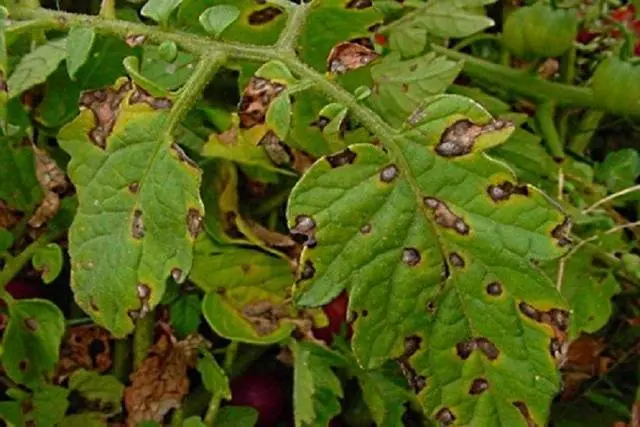 To prevent such a disaster, tubers are sprayed before planting. Biological preparations “Baktofit”, “Integral”, “Planriz” are suitable for prevention. The vegetative period requires treatment with a 0,2% solution of other drugs – Profit, Kuproksat, Thanos. To prevent Fusarium wilt of Granada potatoes, it is best to use Baktofit or Fitosporin.
To prevent such a disaster, tubers are sprayed before planting. Biological preparations “Baktofit”, “Integral”, “Planriz” are suitable for prevention. The vegetative period requires treatment with a 0,2% solution of other drugs – Profit, Kuproksat, Thanos. To prevent Fusarium wilt of Granada potatoes, it is best to use Baktofit or Fitosporin.